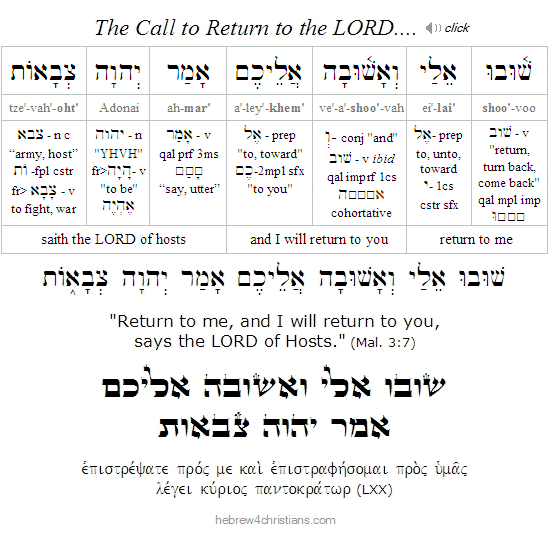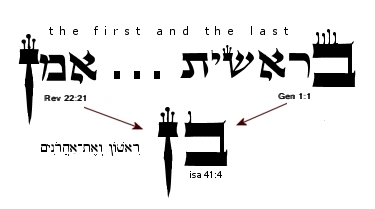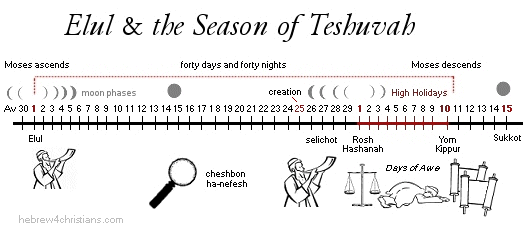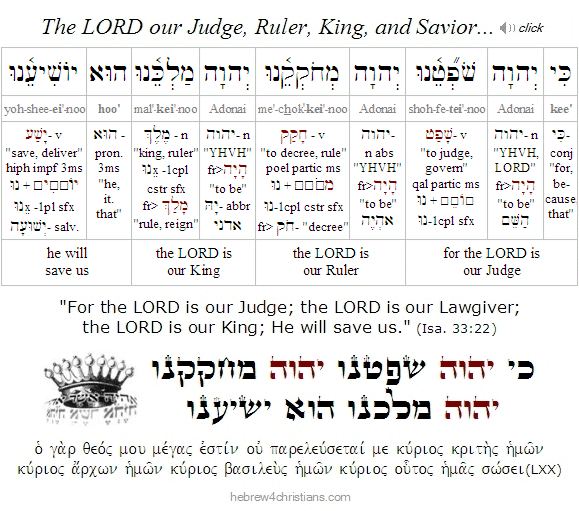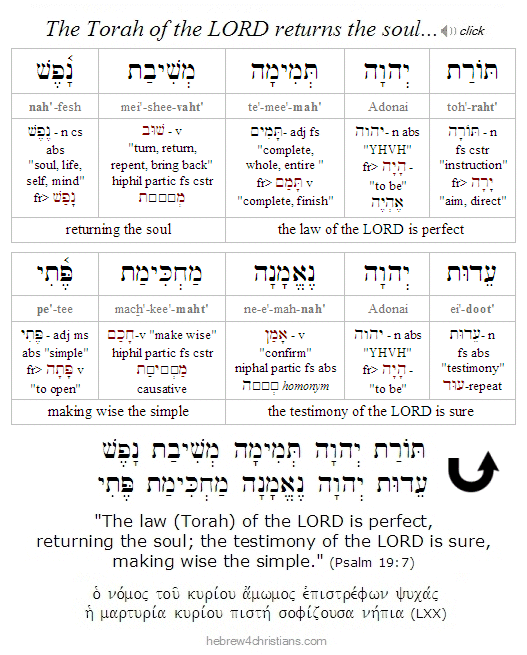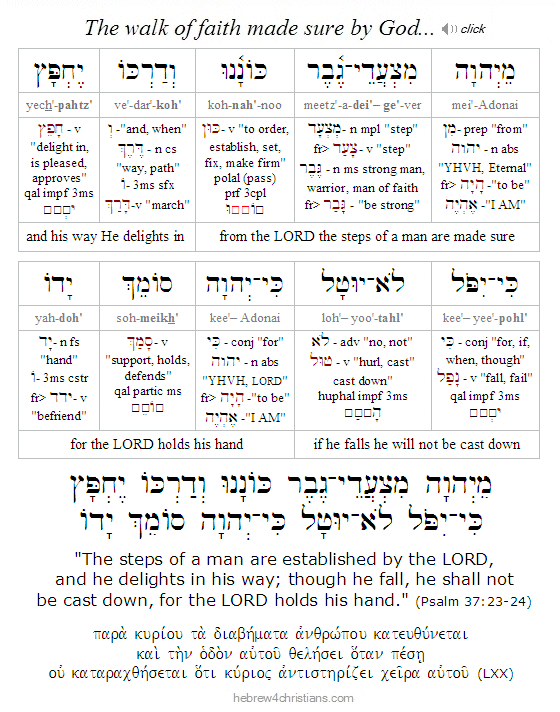|
September 2020 Updates (continued)
Note: If any page content appears to be missing, please refresh the page...
Returning Home...

09.04.20 (Elul 15, 5780) "If we confess our sins..." (1 John 1:9). The question is raised, if a man sins purposely, how can he know whether his intentional repentance can overcome his intentional sin? We must press on, and maintain our teshuvah. Even if we sin 70 x 7 times (Matt. 18:21-22), we are forbidden to regard ourselves as beyond the reach of God's healing love. Our Savior cries out: "Come to me all who are heavy laden, and I will give you rest."
A king's son was at a far distance from his father. Said his friends to him, "Return to your father." He said, "I can't: the way is too far. His father sent to him and said, "Go as far as you are able, and I will come the rest of the way to you. Thus says the Holy One, blessed be He: "Return to me, and I will return to you, says the LORD of hosts" (Mal. 3:7).
שׁוּבוּ אֵלַי וְאָשׁוּבָה אֲלֵיכֶם
אָמַר יְהוָה צְבָאוֹת
shoo'·voo · e·lai · ve·a·shoo'·vah · a·ley·khem
a·mar · Adonai · tze·va·ot

"Return to me, and I will return to you,
says the LORD of hosts." (Mal. 3:7)

Click to listen and learn the Hebrew text:
"Know therefore today and return to your heart (והשׁבת אל־לבבך), for the LORD is God in heaven above and on the earth beneath; there is no other" (Deut. 4:39). Here again we see the centrality of the heart as the mode to encounter God (Luke 17:21).
It is never too late to turn to God... there is always hope. The prophet Jeremiah spoke in the Name of the LORD: "Return, faithless Israel, declares the LORD. I will not look on you in anger, for I am kind (כִּי־חָסִיד אֲנִי), declares the LORD" (Jer. 3:12). When the people drew back in shame, however, God encouraged them by saying "My children, if you return, will you not be returning to your Father? Return, O faithless sons; I will heal your faithlessness. "Behold, we come to you, for you are the LORD our God" (Jer. 3:22).
Come just as you are...
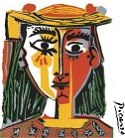
09.04.20 (Elul 15, 5780) Some people seem to think that we first must repent and then we will encounter the Lord, but it's actually the other way around: we first encounter the Savior and then we learn the meaning of repentance. Thus Paul's eyes were opened after he was first blinded by the light (Acts 9:3-6). Likewise, it is only after we have met the Lord that we begin to understand our own blindness of heart, but as learn to see more clearly, we encounter more and more of his love (Rom. 5:20). As Yeshua said, "My yoke is pleasant (χρηστὸς) and my burden is light (Matt. 11:30). Teshuvah, then, is a progressive and ongoing process of awakening, as we learn to love God and to accept ourselves, despite our struggle with sin. As St. Anselm once prayed: "O Lord, grant us grace to desire thee with all our hearts, that so desiring, we may seek and find thee, and so finding thee, may love thee, and loving thee may hate those things from which you have redeemed us." Amen.
We encounter the Lord "just as we are," by means of his gracious intervention in our lives, and so we continue to live by faith in God's grace (indeed, what we call "sanctification" is often just "catching up" with the miracle of his revelation to us). And we always come to God "just as we are," since we are never more than what we are in the truth: "by the grace of God I am what I am," as Paul said. "For all things come from You, and from your hand we give back to you" (1 Chron. 29:14). Therefore the Spirit says, "Come just as you are, or you may never come at all...."
Click for a Hebrew reading lesson:
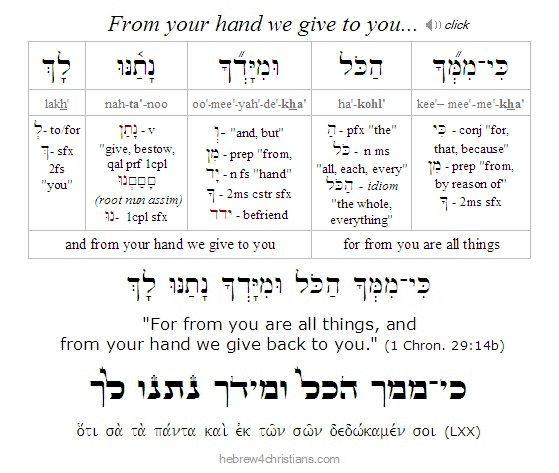 |
A prayer to the One calling you to come: "I come to you just as I am - needy, sick within, weary, and broken... I come seeking your love; I come because you invited me to come: I open my heart, such as it is, to you; please join me here, in this place of my need, in this place of pain, and wrap me your comfort. I can only love you as I know your love, Lord Yeshua, so please help me to know your love in the truth. Amen."
The First and the Last...
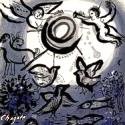
09.04.20 (Elul 15, 5780) The Hebrew letters reveal truth about God. For instance, the very first letter of Torah (i.e., the Bet (בּ) in the word "Bereshit") and the very last letter of the New Testament (i.e., the Nun (נ) in the word "Amen") spell the word בּן ("Son"), the One who is Aleph and Tav (אָלֶף וְתָו), the First and Last, the Beginning and the Ending of the revelation of God. The Apostle John also identifies Yeshua with YHVH (יהוה), the "First and the Last" of whom there is no other God (see Isa. 44:6; Rev. 22:13, etc.). He is called ha-hoveh, ve'hayah, ve'yavo (הַהוֶה וְהָיָה וְיָבוֹא) - "the One who is, and was, and is to come, the Almighty" (Rev. 1:8). Only the LORD God is melech Yisrael (מֶלֶךְ יִשְׂרָאֵל), the true King of Israel.
אֲנִי רִאשׁוֹן וַאֲנִי אַחֲרוֹן
וּמִבַּלְעָדַי אֵין אֱלֹהִים
a·nee · ree·shon · va·a·nee · a·cha·ron
oo·mee·ba·la·dai · ein · E·lo·heem

"I am the first and I am the last;
and besides me there is no God." (Isa. 44:6)
Hebrew Study Card
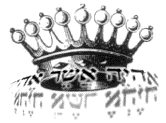
Click to listen and learn the Hebrew text:
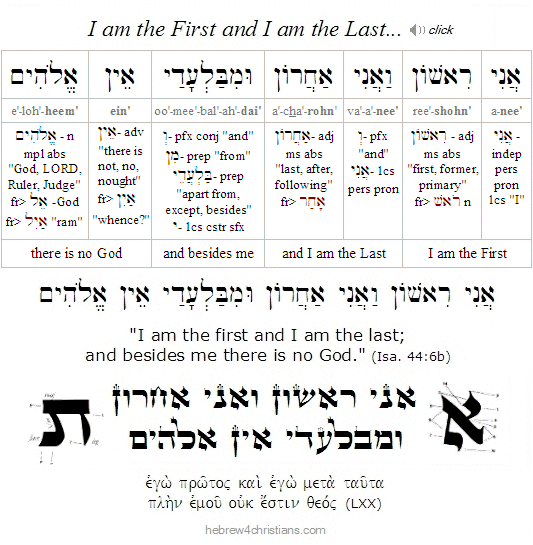 |
Compare the words above from the Book of Isaiah with John's awesome vision given at the island of Patmos and recorded in the Book of Revelation: "When I saw him, I fell at his feet as though dead. But he laid his right hand on me, saying, "Fear not, I am the first and the last (אֲנִי רִאשׁוֹן ואֲנִי אַחֲרוֹן) and the Living One. I died, and behold I am alive forevermore, and I have the keys of death and Hell" (Rev. 1:17-18). Yeshua clearly identifies Himself as YHVH.
Regarding the overmastering glory of Yeshua, the apostle Paul quoted Isaiah 45:23: "I have sworn by myself, the word is gone out of my mouth in righteousness, and shall not return, that unto me every knee shall bow, every tongue shall swear" and applied it directly to the Savior: "Therefore God has highly exalted him and bestowed on him the name that is above every name, so that at the name of Yeshua (Jesus) every knee should bow, in heaven and on earth and under the earth, and every tongue confess that Yeshua the Messiah is Lord (YHVH), to the glory of God the Father" (Phil. 2:9-11; see also Rom. 14:11). "For I am the LORD your God, the Holy One of Israel (קְדוֹשׁ יִשְׂרָאֵל), your Yeshua" (Isa. 43:3).
Click for a Hebrew reading lesson:
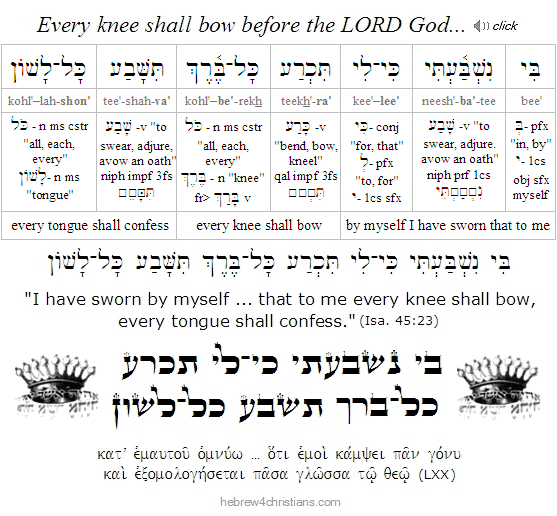 |
Anyone who claims to have "revelation" that pretends to go beyond that which is revealed by the King of Glory who is the First and the Last, the LORD and Redeemer of all; the LORD of the armies of heaven, the One who died and yet is alive forevermore -- will surely face the judgment from the One who holds the keys of death and hell... As it is written of Messiah: "Kiss the Son, lest he be angry, and you perish in the way, for His wrath is quickly kindled... Blessed are all they that put their trust in him (Psalm 2:12). As the prophet further attests: "Who has performed and done this, calling the generations from the beginning? I, the LORD, the First and with the Last; I AM he" (Isa. 41:4).
"Who has ascended to heaven and come down? What is his name, and what is his son's name? Surely you know! / מַה־שְּׁמוֹ וּמַה־שֶּׁם־בְּנוֹ כִּי תֵדָע (Prov. 30:4). Yeshua Ha-Mashiach (Jesus Christ) is YHVH "come in the flesh" (1 John 4:2-3). Indeed, to say "Jesus Christ is Lord" (Phil 2:11; Rom. 10:9) is to confess Him as Adonai -- or YHVH -- Himself. As our Savior Himself solemnly attested, "Whoever does not honor the Son does not honor the Father who sent Him" (John 5:22-23). Indeed, those who do not understand that Yeshua is YHVH, the very LORD of Glory (יהוה הכבוד), do not know who He is!
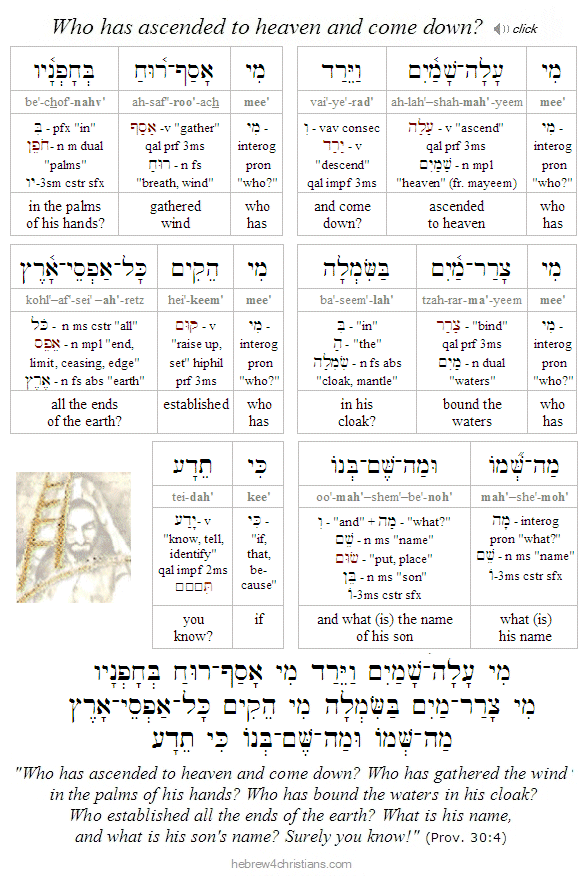 |
 |
Waking Up to Reality...
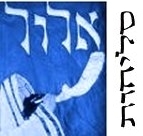
[ The following is related to the month of Elul and the theme of spiritual renewal... ]
09.03.20 (Elul 14, 5780) It's vital to remember that one of the main tactics of the devil is to cast a spell over you to induce a sense of forgetfulness and apathy... The devil wants you to forget that you are a child of the King. The entire venture of teshuvah (repentance) presupposes that you are created b'tzelem Elohim - in the image of God - and therefore you have infinite value and dignity. This is all the more evident in light of the awesome ransom that Yeshua paid to reconcile your soul with God. So what is the greatest sin you can commit in your life? To forget what God has done for you... Remaining asleep, unmindful of your true identity is one of the most tragic things of life. Therefore Rosh Hashanah is sometimes called Yom Ha-Zikaron - the "Day of Remembrance" (Lev. 23:24). The blast of the shofar is meant to jolt us from our sleep... We are to remember who we really are -- to remember that God is our King. The person who says, "Tomorrow I will do teshuvah" really is saying, "Not now." And then tomorrow comes and he says, "Not now." And in this way his entire life passes by, saying, "Not now." Finally one day he wakes up only to find himself already dead. May God help us wake up to the Reality that is set before us.
 Listen to the Shofar (click speaker icon) Listen to the Shofar (click speaker icon)
During this season (and always) we make a conscious effort to turn back to reality: first, we turn back to God and to ourselves (i.e., self-examination and confession); second, we turn to others we have harmed (i.e., asking for forgiveness), and third, we turn to others in need (i.e., giving tzedakah). I realize that we are to do teshuvah every day, of course (Psalm 16:8); though the "Season of Teshuvah" provides us with an opportunity to again remember the importance of these matters. As Yisrael Salanter wisely said: "Consider every day as if were an Elul day, and Elul itself is of course Elul."
The appointed hour draws near; the "footsteps of the Messiah" are approaching. Let us then heed the admonition of our Savior: "when you see these things taking place, you know that the time is near, right at the door" (Mark 13:29), and let us encourage one another to wake up and come alive: "Awake, O sleeper, and arise from the dead, and Messiah will shine on you!" (Eph. 5:14). The message of teshuvah (repentance, "turning back to God") is always, "Wake up - you are living a nightmare." There is only one remedy, and that is discovered by coming to the Divine Light by opening your heart to the love and very real presence of God.
Click for a Hebrew reading lesson:
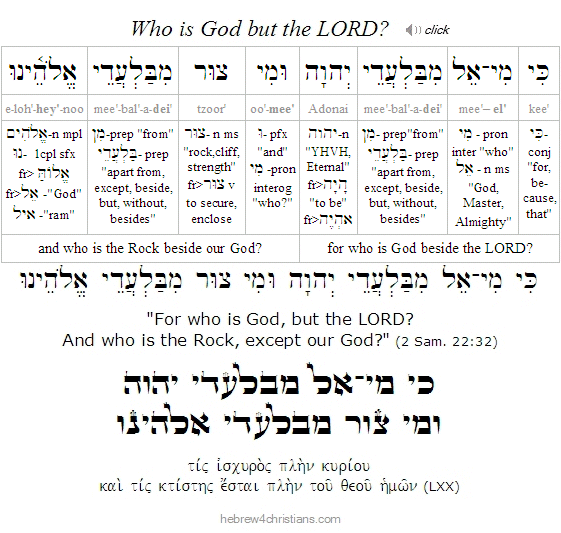 |
 |
High Cost for Apathy...
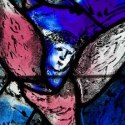
[ The following entry concerns this week's Torah reading, parashat Ki Tavo.... ]
09.03.20 (Elul 14, 5780) From our Torah for this week (i.e., Ki Tavo) we read: "Cursed is anyone who does not uphold the words of this Torah to do them" (Deut. 27:26). This is because God is God, ultimate reality is non-negotiable, and we are entirely and eternally accountable for all that we do (Matt. 12:36; Heb. 4:13). "Each person's deeds will become manifest, for the Day will disclose it, because it will be revealed by fire, and the fire will test what sort of deeds each one has done" (1 Cor. 3:13). There is a Scroll that attests the reality of all truth, and the life of every soul created by God is recorded therein (Rev. 20:12).
We are forbidden to add or subtract from Torah, since that is to refashion God's message into one of our own understanding (Deut. 4:2). Reading the tochachah or "rebuke" in our portion (i.e., Deut. 28:15-68) is difficult and painful, though it serves as a bitter medicine to wake us up from our lethal coma. In that sense the tochechah is a great blessing, since it shocks us into experiencing the "gravity of God's grace." This is why Yeshua proclaimed grave warnings about the dangers of forfeiting life and thereby "receiving" hell... Sin is a lethal problem, and we must turn to God for healing or we will die.
The Lord does not allow us to trifle with the truth, neither will he offer us a good that excludes Divine Reality since there simply is no such thing. God does not give us the option of affecting existential indifference toward Him, since apathy is as much a spiritual decision as is outright rebellion and apostasy. "If anyone thinks he has faith yet is indifferent toward this possession, is neither hot nor cold, he can be certain that he does not have faith. If anyone thinks he is a Christian and yet is indifferent toward being that, then he is not really one at all. Indeed what would we think of a person who gave assurances that he was in love and also that it was a matter of indifference to him?" (Kierkegaard: Works of Love). "Guard me, O God, for in you I take refuge. I say to the Lord, "You are my Lord; I have no good apart from you" (Psalm 16:1-2).
Click for a Hebrew reading lesson:
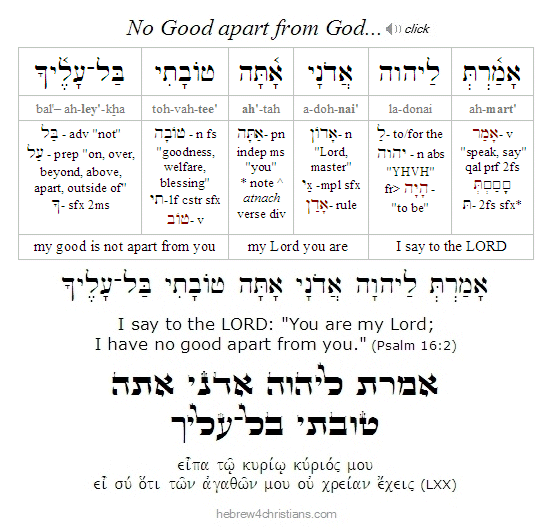 |
 |
Why Celebrate Rosh Hashanah?
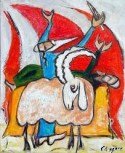
[ The holiday of Rosh Hashanah begins Friday, September 18th at sundown... ]
09.03.20 (Elul 14, 5780) Should followers of Yeshua observe the festival of Rosh Hashanah? Surely you know my answer, chaverim, but I thought I'd provide a few reasons why we observe this special time for the sake of our Christian friends who might not understand the importance of the moedim (appointed times). What follows is a "short list" of reasons; for more information, read various articles regarding teshuvah I've written over the years.
- First, the LORD God is indeed the King of all the earth, our Creator and Redeemer. He is Melech Gadol al-kol-ha'aretz, (מֶלֶךְ גָּדוֹל עַל־כָּל־הָאָרֶץ), a "great King over all the earth" (Psalm 47:2). Though Christians should acknowledge His righteous rule and Kingship at all times, Rosh Hashanah is a "sanctified reminder" of God's creative authority in our lives. Yeshua (Jesus) is called the Mashiach (מָשִׁיחַ), a term that denotes His Kingly dignity and royalty (this idea is unfortunately obscured by the Greek word "Christ"). Yeshua is also borei Olam - the Creator and Sustainer of all creation (Col. 1:16). He is coming to rule and reign from Jerusalem (Zion) in the near future. Christians will be judged according to their deeds of service (2 Cor. 5:10) and the world system (and Satan) will be judged during the Great Tribulation period that precedes the Second Coming. Just as the heavenly shofar was sounded from Sinai, so it will be one day sounded from Zion (Isa. 27:13).
As the only true King and Judge, God indeed has a Sefer HaChayim (Book of Life) as well as a Sefer Ha-Metim (Book of Death). The Scriptures clearly warn that on the Day of Judgment to come, anyone's name not found written in the Book of Life will be thrown into the lake of fire (Rev. 20:15). The Kingship of our LORD should be of great interest to those who wish to honor Him...
- Second, the month of Elul and the preparation for Rosh Hashanah reminds us to be ready for the soon appearance of King Yeshua our LORD. Though we do not know the exact day or hour of His return to possess His kingdom on earth, we are commanded to watch and be ready for His soon appearance. We ought, therefore, be in a constant state of repentance (teshuvah) as we seek to humble ourselves and walk with our God.
The New Testament links teshuvah with salvation (יְשׁוּעָה) itself. Yeshua's first message was "Repent and believe the gospel (בְּשׂוֹרָה)" (Mark 1:15), and Paul linked teshuvah with confession and trust in the saving work of the Messiah on our behalf (Rom. 10:8-13). Teshuvah implies a response to the Person of Yeshua that is demonstrated through confession that He is none other than YHVH, the LORD of Compassion and grace. The sound of the shofar is meant to awaken our hearts and to prepare for the coming time of judgment.
- Third, Rosh Hashanah itself, or rather Yom Teru'ah, has prophetic significance in the life of the Christian. The blowing of the shofar is prophetic of the rapture of the church, where those who are part of the Bride of Mashiach, the "church," will experience everlasting transformation:
"Behold, I show you a mystery; We shall not all sleep, but we shall all be changed, in a moment, in the twinkling of an eye, at the last trumpet (shofar): for the trumpet (shofar) shall sound, and the dead shall be raised incorruptible, and we shall be changed." (1 Cor. 15:51)
Note that the Talmud states that on Rosh Hashanah the dead will be raised (Rosh Hashanah 16b). This corresponds to the "last trump" mentioned by the Apostle Paul (1 Cor. 15:52).
- Fourth, the Tashlikh (תַּשְׁלִיךְ) ceremony reminds us that our LORD is a God of new beginnings, and even if we have sinned and fallen away from Him, He is faithful to restore us and cast our sins away from us. After all, God sent His only Son Yeshua to be our Sin-Bearer and Kapparah (atonement), so we can take comfort in His forgiveness when we earnestly seek to repent from the harm we have done and begin anew.
- Fifth, we should be grateful to the LORD for writing our names in the Lamb's Book of Life, or Sefer HaChayim (סֵפֶר הַחַיִּים). Of course we don't believe that we are made acceptable in the LORD's eyes by means of our own works of righteousness (Titus 3:5-6), but that doesn't excuse us from being without the "fruit of the Spirit" in our lives. For more information on this, see "Yom Kippur and the Gospel."
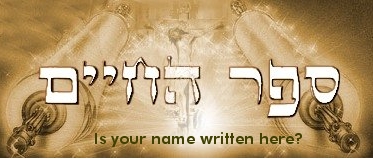
- Sixth, the Akedat Yitzchak ("Binding of Isaac") is a major theme of Rosh Hashanah. As he went to sacrifice his beloved son upon the altar at Moriah, Abraham prophetically said: "God will provide for himself the lamb" (אֱלהִים יִרְאֶה־לּוֹ הַשֶּׂה). After binding Isaac and raising the knife, however, the Angel of the LORD intervened and Abraham was given a ram as substitute. According to Jewish tradition, God told Abraham that the ram's horn (shofar) should be blown on Rosh Hashanah to remind the people of the substitutionary sacrifice provided by the LORD Himself -- an echo of the very First Sacrifice offered in Eden. In light of this, how much more then should we remember the sacrifice of Yeshua the Great Lamb of God during this time? (For more information, see the article, "The Gospel in the Garden.")

- Finally, we anticipate the prophetic fulfillment of the LORD's covenant faithfulness to Israel when we understand that the Yamim Nora'im ("Days of Awe") foreshadow the future repentance of national Israel in the days to come. This pictures the Great Tribulation and Yom Adonai - the great Day of the LORD - that arrives just before national Israel's ultimate shuvah (return). Yom Kippur is the Holiday that pictures the full restoration of Israel to all her covenant promises with Yeshua as the recognized Kohen Gadol (High Priest) of the New Covenant. The Brit Chadashah will be embraced and Yeshua will be revealed as Israel's Savior, LORD, and Deliverer. Then "all Israel shall be saved" (Rom. 11:26).
So yes, for these and other reasons a Christian should observe the significance of Rosh Hashanah (and the other Biblical "appointed times"). For more information, please see the Rosh Hashanah pages. Shanah Tovah!
Click for a Hebrew reading lesson:
Exile and Joy...
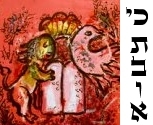
09.02.20 (Elul 13, 5780) In our Torah portion this week (Ki Tavo) we are warned of exile if we fail to express simchah (joy) for the fruit of our lives (see Deut. 28:45-47). We are to offer our bikkurim (first fruits) from an inward store of gratitude, from a heart that recounts the history of God's deliverance (Deut. 26:1-11). We don't superficially enter into the land. Instead of attaining joy by keeping the commandments, we keep the commandments by attaining joy, which is another way of saying that faith is the essence of all true Torah. "If we do not fulfill a mitzvah with joy, we do not understand the meaning of a mitzvah."
A Chassidic story, undoubtedly influenced by the New Testament, says that Rabbi Shmelke and Rabbi Moshe Leib of Sassov were traveling on a ship when a dangerous storm arose that threatened to destroy the vessel. Rabbi Shmelke went over to the Sassover and saw that he was engaged in a joyful dance. "Why are you dancing?" asked Shmelke. "I am overjoyed at the thought that I shall soon arrive in the mansion of my Father." "I shall join you, then," said Shmelke. But the storm spent its force, and the ship reached port in safety.
Inner joy comes from entirely trusting that God loves, forgives, and accepts you... Joy and peace spontaneously arise when you realize that God knows your "story" and promises you a "happy ending." It is faith in God's personal love for you...
Click for a Hebrew reading lesson:
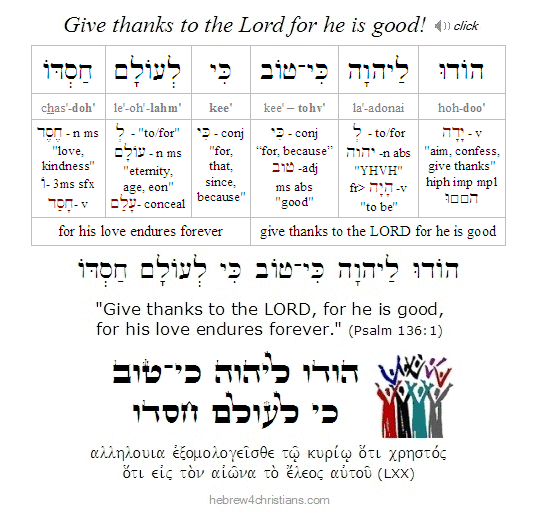 |
 |
A Word from the Spirit...
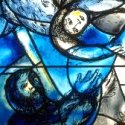
09.02.20 (Elul 13, 5780) "I go to prepare a place for you... on the other side of this veil; the place of my secret chamber. Look into my eyes before I go; see my heart's passion: I am aflame for you, and yet I must go; I must... There is no other way but through, through the waste places, into the darkest pitch, across that chasm... But don't let your heart be troubled, for this demonstrates my love and seals my word to you forever. And though we must be apart for a season, I swear I will come again for you, to take you through this veil to be with me forever. Do not lose heart, my beloved. I am coming soon; my hand is upon the door..."
Do you have trouble receiving these words as your own? Henri Nouwen keenly wrote: "There are two realities to which you must cling. First, God has promised that you will receive the love you have been searching for, and second, God is faithful to that promise." You must believe the "yes" that comes back when you ask, "Do you love me?" You must choose this "yes" even when you do not experience it" (Inner Voice of Love). You have to trust the place that is solid, despite the gnawing sense of inner emptiness and the inevitable changes of life...
Click for a Hebrew reading lesson:
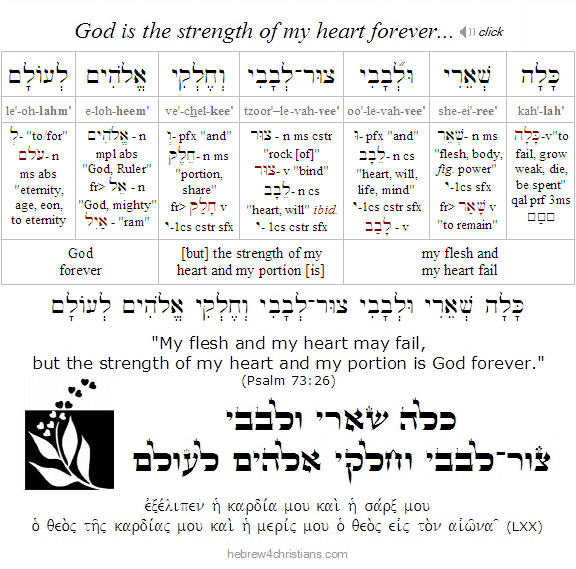 |
Note about Henri Nouwen
Someone chided me for quoting the late Henri Nouwen, since he was a Catholic who struggled with depression, anxiety, and had some other concerns. But do we have to agree with everything a person says to learn anything from him or her? and indeed it is not foolish to immediately judge all that comes out of person's mouth as being false just because they may have some ideas wrong? I don't read Nouwen for his sacramental theology or his Roman Catholic views of the church; instead I sometimes read him because he tried to walk out his faith in the midst of his own heartaches and troubles. Some of what he has written is helpful and insightful, though that does not mean that I am endorsing everything he ever said or wrote -- why should it? There is an adage of the sages, אֵיזֶהוּ חָכָם? הַלּוֹמֵד מִכָּל אָדָם -- eizehu chacham? Halomed mikol adam, "Who is wise? the one who learns from everyone." All truth is God's truth, and even the devil can quote Scripture, though he twists its intent and meaning. On the other hand, God reveals truth to all of his creation. The Apostle Paul quoted a pagan poet in his sermon on Mars Hill - "For in him we live, and move, and have our being; as certain also of your own poets have said, For we are also his offspring" (Acts 17:28). Likewise Yeshua quoted from the Torah in ways that scandalized the "religious" Jews who thought they alone had the right interpretation for the word of God.
We are to test the spirits, of course, but that does not mean that we are to "cancel" everyone who does not line up perfectly with our theology.... Test the spirits; discern what is true and what is false, and guard your heart - yes; but to "cancel" other people and to only listen to those who agree with our own thinking is to live in fear...
 |
Teshuvah and Sin...

09.01.20 (Elul 12, 5780) Many souls minimize the idea of sin because they fail to recognize it as life-threatening, lethal, and spiritually disastrous. Sin (and its justification in our lives) cuts us off from God, however, and that invariably leads to a sense of existential dread (Isa. 59:2; Ezek. 18:4). "The wages of sin is death" (Rom. 6:23), and that means those who practice sin are considered "dead" even while alive (Berachot 18a-b). Tragically, sin can lead to the dreadful punishment of karet (כָּרֵת), being "cut off" from any awareness of the Truth. Regarding this the sages note that the Hebrew word for sin, chet (חַטְא), is written with a silent Aleph (א) because when we sin, the Master and LORD (אַלּוּף) is present, because without his power no one could lift his hand to do anything great or small. Here we note the terrible reality that our sin is witnessed by God himself, a pain that pierces his very heart.
נַחְפְּשָׂה דְרָכֵינוּ וְנַחְקרָה
וְנָשׁוּבָה עַד־יְהוָה
nach·pe·sah de·rah·khei'·noo ve·nach·ko'·rah
ve·na·shoo'·vah ad-Adonai

"Let us search and examine our ways
and turn back to the LORD!"
(Lam. 3:40)

Click for a quick Hebrew reading lesson:
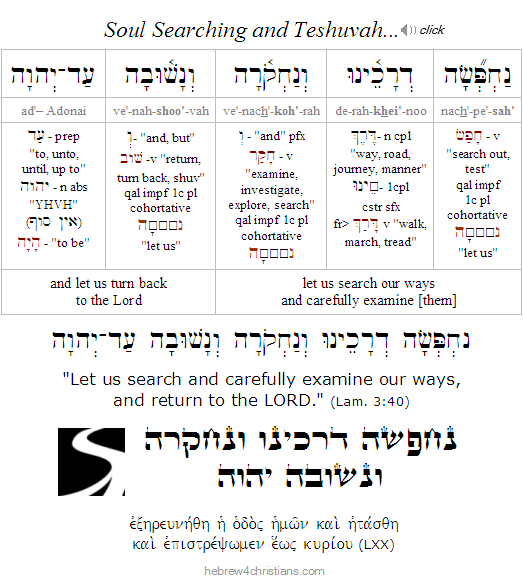
In the time leading up to the High Holidays, we examine our lives and confess our sins (חֶשְׁבּוֹן הַנֶּפֶשׁ). Though God forgives us because of Yeshua's sacrifice, we nevertheless are called to turn away from sin and draw closer to the heart of the Father (1 John 1:9; James 4:8). "A person who claims to be connected with Him ought to live his life in the manner he did" (i.e., καθὼς ἐκεῖνος περιεπάτησεν καὶ αὐτὸς οὕτως περιπατεῖν: 1 John 2:6). Some people relegate the severity of sin to the idea of "judgment" taught in Torah. Understand that the cross *never* gives us license to sin but should awaken within us a desire to live in godly reverence by the power of God's Spirit... We are set free from sin by God's mercy, but again, that implies that we turn away from sin and live in the truth. "Freedom" does not mean the license to do whatever you want, but rather the power to do good.
Rabbi Bunam told the parable of how a father made a loan to his son to help him start a business. When the time for repayment came, he learned his son had used the money wisely, and therefore he made him a gift of the amount loaned. Later the father did the same for another son, but when time for repayment came, he learned that the son had used the investment unwisely, so to prevent further losses, he compelled his son to give up the business. It is the same with us. God loans us the impulse to judge ourselves and repent of our unworthy deeds. If we use this impulse wisely, he gives us further resolve to walk in righteousness. But if we disregard the impulse and do nothing, God takes it back, and we remain stuck in our present condition (Rom. 1:28). May God help us turn to Him...
Click for a quick Hebrew reading lesson:
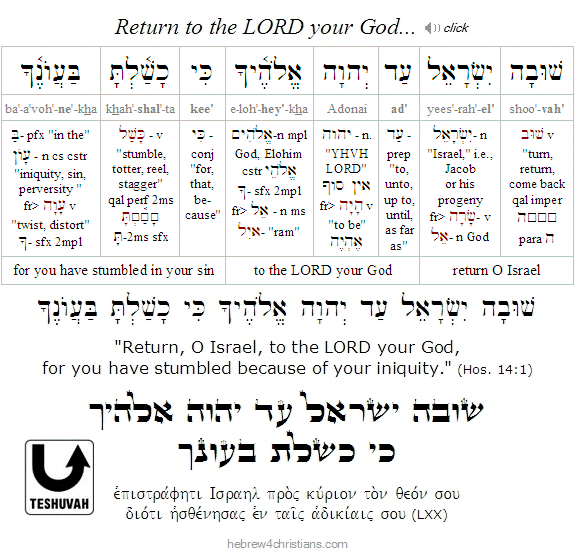 |
"Remember that the right direction leads not only to peace but to knowledge. When a man is getting better he understands more and more clearly the evil that is still left in him. When a man is getting worse he understands his own badness less and less. A moderately bad man knows he is not very good: a thoroughly bad man thinks he is all right. This is common sense, really. You understand sleep when you are awake, not while you are sleeping. You can see mistakes in arithmetic when your mind is working properly: while you are making them you cannot see them. You can understand the nature of drunkenness when you are sober, not when you are drunk. Good people know about both good and evil: bad people do not know about either." - C.S. Lewis
Torah of Teshuvah...
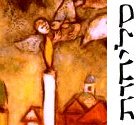
09.01.20 (Elul 12, 5780) Perhaps you (like me) once learned Psalm 19:7 as, "The law of the LORD is perfect, converting the soul." However, the Hebrew text might better be translated as, "The instruction (i.e., Torah) of the LORD is perfect, returning the soul." This is the message of teshuvah (תְּשׁוּבָה), or "repentance," of course. We turn away from ourselves to discover that only the love of God given in Yeshua gives life to our dead hearts (Mark 1:15). Teshuvah is therefore first of all a matter of faith, of trusting in the miracle of God. And though it is indeed a great gift from heaven, it requires that we pass through the "narrow gate" of humility by confessing the truth about who we are (Matt. 7:13). We turn away from our pride; we acknowledge our inner poverty, our neediness, and we mourn over the loss and hurt caused by our sin. Teshuvah turns us away from our attempts to defend or justify ourselves and instead turns to God to heal our separation from love (Rom. 8:3-4). The miracle of love buries our old nature and transforms us into a new creation (2 Cor. 5:17).
תּוֹרַת יְהוָה תְּמִימָה מְשִׁיבַת נָפֶשׁ
עֵדוּת יְהוָה נֶאֱמָנָה מַחְכִּימַת פֶּתִי
torat · Adonai · temimat · meshivat · nafesh
eidut · Adonai · ne'emanah · machkimat · peti

"The Torah of the LORD is perfect, returning the soul;
the testimony of the LORD is sure, making wise the simple."
(Psalm 19:7)
Download Study Card

Click for a quick Hebrew reading lesson:
Established in God's Way...

09.01.20 (Elul 12, 5780) When you come to know the truth that the LORD is your Rock, the very ground upon which you live, move, and have your being, then are your steps are made sure, as it says, "The steps of a man are established by the LORD, when he delights in his way; though he fall, he shall not be cast down: for the LORD holds his hand" (Psalm 37:23-24). When you are unsure of your way, however, when you walk in uncertainty, you are unsteady in your resolve and are tempted to regard your life as being without any solid foundation. As you commit your way to the LORD, your steps are made sure, for you are walking before his Presence, and therefore you are upheld by his power.
Click for a quick Hebrew reading lesson:
|














